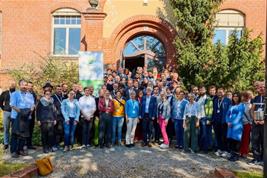21.10.2025
Press release

On 30 September and 1 October 2025, the third FAIRagro annual plenary took place at the Julius Kühn Institute in Berlin-Dahlem, with more than 80 representatives of the participating institutions in attendance. The two-day meeting focused on exchanging current results from FAIRagro measures and working groups, and on the consortium's future strategic direction. As part of the National Research Data Infrastructure (NFDI), FAIRagro is committed to establishing a sustainable, interoperable data infrastructure for agrosystem research in Germany.
The annual meeting offers all co-applicants and participants insights into the ongoing development of the research data infrastructure for agrosystems research. It also provides an opportunity for personal interaction and collaborative planning for the future.
Over 80 participants travelled to the Julius Kühn Institute in Berlin-Dahlem to discuss progress so far in developing products and services, and to plan for future success. Four new associated partners from related disciplines were also welcomed into the FAIRagro circle.
Four new associate partners
FAIRagro continues to grow. Four new partners are set to join the network: the Research Institute for Livestock Biology (FBN) in Dummerstorf; the Eberswalde University for Sustainable Development (HNEE); Justus Liebig University Giessen (JLU); and the German Plant Innovation Community (GFPi). These additions strengthen FAIRagro's connections to related disciplines, including animal health, agroforestry systems, sustainable land use, and plant innovation.
A diverse program
The FAIRagro working groups presented their interim results, tools and services in the form of 26 posters, boards and live demonstrations, including access to climate data, AI-supported metadata enrichment and FAIR data standards. These interactive formats generated considerable interest and encouraged in-depth discussion.
Other notable contributions were the presentations on the participants' various activities and the 13 current use cases, including the IGZ's first successfully completed pilot project.
Participants' commitment was also evident in the breakout sessions, where small groups discussed key topics such as interoperability, research data visibility, legal metadata and new data management tools. Additionally, the dynamic 'fish bowl' discussion format was employed to openly discuss pressing future issues for FAIRagro.
Review and outlook
FAIRagro spokesperson Prof. Frank Ewert discussed the current structural evaluation of the National Research Data Infrastructure (NFDI) by the German Council of Science and Humanities, as well as the recommendations for its further development.
In his personal conclusion, Ewert emphasized how much the FAIRagro consortium has grown in such a short time: "It is impressive to see how FAIRagro has grown into a committed, interdisciplinary team in such a short time. We have made great progress—now we need to align our products and services more closely with the needs of our community to jointly design FAIR research data management for agrosystem research."
Further information:
www.fairagro.net
